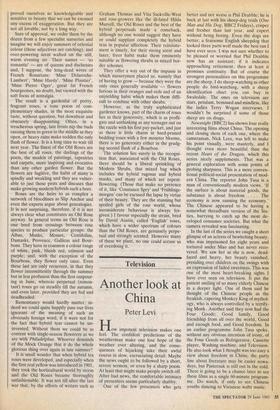Television
Another look at China
Peter Levi
How impotent television makes one feel. The confident predictions of the weatherman make one lose hope of the weather ever altering, and the conse- quences of hijacking take their awful course in slow, excruciating detail. Maybe the news ought to be followed by a short, severe sermon, or even by a sharp poem. At least that might make people switch off. After bad news, the comfortable intimacy of presenters seems particularly shabby.
One of the few presenters who gets
better and not worse is Phil Drabble; he is back at last with his sheep-dog trials (One Man and His Dog, BBC2 Fridays), crisper. and fresher than last year, and expert without being boring. Even the dogs are better; a fearsome English sheepdog that looked three parts wolf made the best run I have ever seen. I was not sure whether to be pleased or worried that Phil Drabble now has an assistant; if it indicates approaching retirement, then at least it promises continuity. But of course the strongest personalities on this programme are the sheep. I do sheep-watching as other people do bird-watching, with a sheep identification chart you can buy in Swaledale. The ones on television are stars, petulant, bemused and mindless, like the ladies Terry Wogan interviews. I wouldn't be surprised if some of those sheep are on drugs.
Newsnight (BBC2) has shown four really interesting films about China. The opening and closing shots of each one, where the cameraman, Nick Lera, was left to make his point visually, were masterly, and I thought even more beautiful than the recent Heart of the Dragon, which this series nicely supplements. That was a general exploration with some points of probing sharpness. This is a more conven- tional political-social presentation of mod- ern China. The reporter John Tusa is a man of conventionally modern views. 'If the surface is about material goods, the substance is about freedom . . . . The economy is now running the economy.' The Chinese appeared to be having a somewhat threadbare version of the Six- ties, hurrying to catch up the most de- veloped consumer societies. But what the camera revealed was fascinating.
In the last of the series we caught a short glimpse of an actress of bewitching beauty, who was imprisoned for eight years and tortured under Mao and has never reco- vered. We saw her as she is now, dead- faced and heavy, her beauty vanished, presiding over children on the swings with an expression of faded sweetness. This was one of the most heart-breaking sights I have ever seen on television. It put the patient smiling of so many elderly Chinese in a deeper light. One of them said he thought of the Chinese people as the freakish, capering Monkey King of mythol- ogy, who is always controlled by a terrify- ing Monk. Another said they now had the Four Goods: Good family, Good friendship from all over the world, Good and enough food, and Good freedom. In an earlier programme John Tusa spoke, without any obvious intention of irony, of the Four Goods as Refrigerator, Cassette player, Washing machine, and Television.
He also took what I thought was too easy a view about freedom in China; the party line about literature may be easier nowa- days, but Pasternak is still out in the cold. There is going to be a chance later to see these films as a single 60-minute program- me. Do watch, if only to see Chinese youths dancing to Viennese waltz music.


























































 Previous page
Previous page